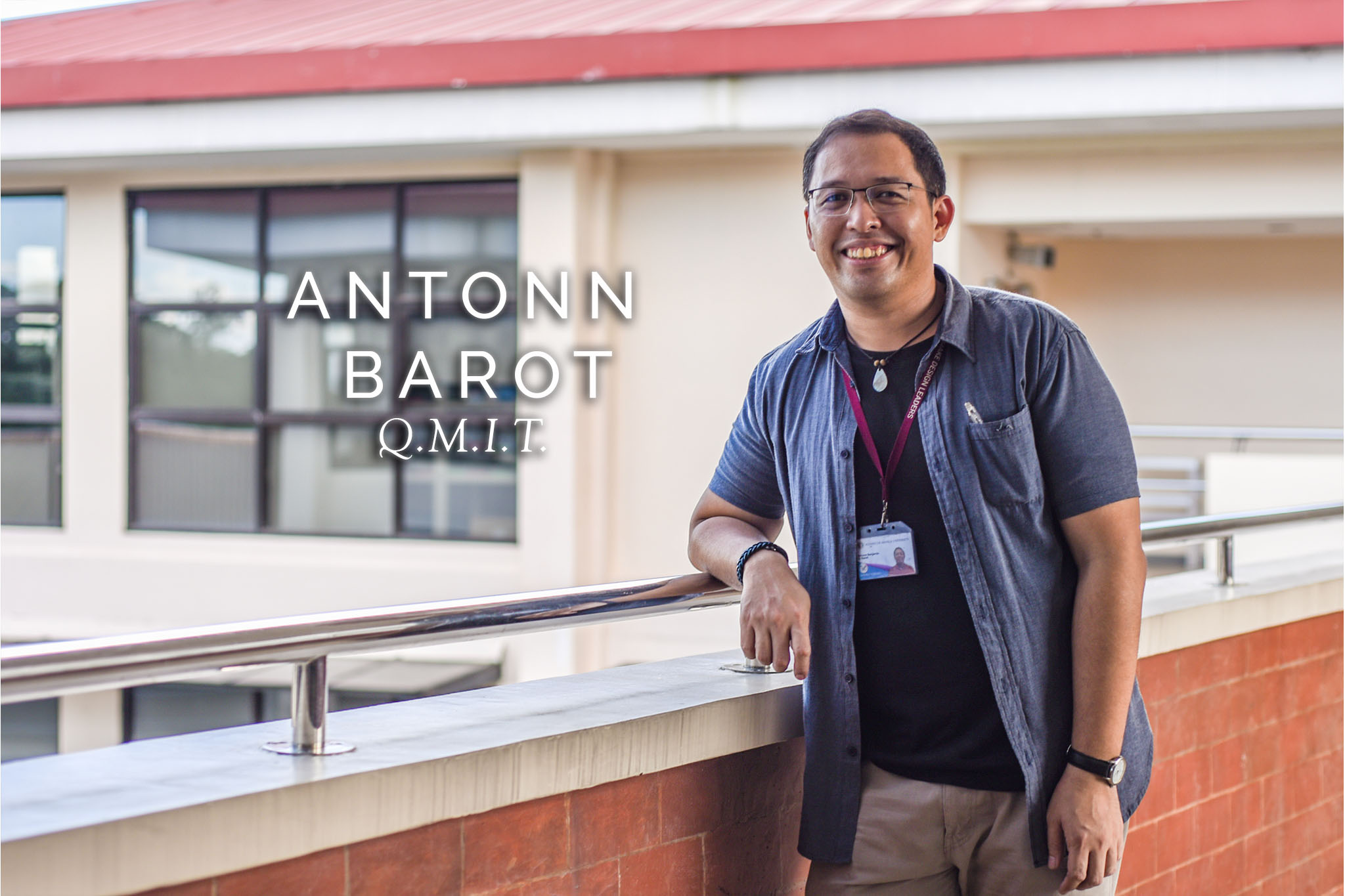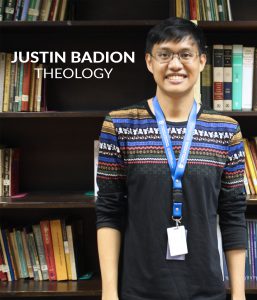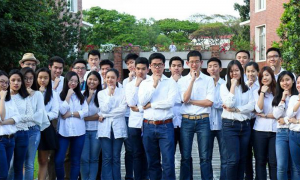Written by Lucas Po. Edited by Denise Joaquin and Matthew Yuching.
Photo Header by Bruce Ong.
He’s quirky and fun, witty and engaging, and you always walk away from every conversation with some new insight on business or even life. IT Consultant, baking enthusiast, INTACT Facilitator, JSEC Challenge judge, one can easily say that Sir Antonn Barot of the QMIT and MIS Department wears many hats. In fact, given his dynamic teaching style and unique presence in campus, it isn’t a stretch to say that Sir Barot is the SOM Department’s answer to legendary professors like Fr. Dacanay or Mr. Peabody. Last September, I met him in the SOM Department, where we had a delightful conversation about his work in the department, his mentors in Ateneo, and his advice for college students.
Lucas Po (LP): So to start this whole thing, how are your classes?
Antonn Barot (AB): Well, for this semester, I have five classes. I have two INTACT classes, one POM 102 class, and I am also teaching an MIS elective, MIS 181.8 or “Business Process Management.” I teach in the MIS Department, as I am, in fact, an MIS graduate here in Ateneo.
LP: Other than your INTACT classes, it seems like the classes you teach are focused on technology or more complicated mathematics. How did you start being interested in these subjects?
AB: Ehh, so first off, I wouldn’t call it complicated mathematics, because it won’t be difficult once you see the practicality of it. Well, for me, I guess, I’ve always had a passion for computing. I began as an IT professional before teaching. I was batch 1 of Dell when it first arrived in the Philippines, and I was also Dell Manila’s first casualty [chuckles]. I don’t know, I always liked IT. You could say that that passion started from my love of science fiction, I grew up admiring the hacker character from Seaquest DSV, for example. And it wasn’t about programming, it was more about the problem solving I really enjoyed in computer science.
As for math, well actually, I used to really suck at math growing up. Grade school, high school, oh my God that was so bad [laughs]. It was only until college where I realized how math was so practical. Like, I said to myself “Oh, it was actually so simple, it actually made sense.” One of my biggest regrets, in fact, was not getting an A in Math 11 when I knew that I could’ve tried harder.
LP: So I heard that you were Ateneo since grade school. So, tell me, what do you think are the values that Ateneo instilled in you given that you have been here from the cradle to today?
AB: Yeah, if you look at it that way, yes, that is very accurate. [laughs]. Well, as an Atenean, there are two things that the school drills into you. One is the Prayer of Generosity of St. Ignatius, and the other is the whole being persons for others. I guess it would be those two. If the Prayer for Generosity goes “Dearest Lord, teach me to serve as you deserve, to give and not count the cost,” and you are familiar with how “Persons for others” goes. If you look at it, it all boils down to one thing: giving more. Giving more than what is asked. And that does not mean you should stress yourself out.
These two things, it does shape you. Ever since grade school, you learned these things, alongside the fact that La Salle is the enemy [laughs]. All kidding aside, it really shows a particular kind of upbringing, where you are called to care for others but you give more than what is asked.
LP: Were there any teachers in Ateneo Grade School or High School who inspired you to teach? Any mentors in college who did the same?
AB: Yes to both, but to make things clear: I actually didn’t want to be a teacher. It’s not something where I said: oh, after I graduate. No, this wasn’t my career choice for me. Back then, I honestly thought I would stay in the IT industry, that I would excel and make millions of pesos. I never thought I would become a teacher. I became a teacher when in 2009, my mom said, “You try working being a consultant, you try the IT field,” and I was invited to teach here in the school in the summer of 2009. So I said “Yes, why not,” and later I realized that that would be the last advice my Mom would give because a week later, she would pass away. So sabi ko, “I’ll try,” and I owe her that much. Also, I was a full tuition scholar in Ateneo, so I always had this longing to give back. I mean sure there are scholar hours, but iba e (it’s different).
I don’t know, for me, there are two kinds of teachers you remember: the ones who were either very strict or had a unique approach. In grade school, there were two teachers who really impacted me. There was Mrs. Marissa Cantillon, my prep teacher, my very first teacher who was very motherly, so to speak. The other one was Mrs. Malilin-Borja, who I remember to be very stern, like my goodness [laughs]. Well, she was stern but fair, like as in, she’d push you.
For college naman, I had not just many memorable profs, but also mentors. Ms. Martipaz Ortiz was one, I think she’s director now for Guidance Head in Ateneo High School. But the one guy who really took me under his wing was Sir Bong Olpoc. He was a big impact, he was my professor twice and my thesis adviser. I learned most of the trade of operations and business processes while I was under him. I shadowed under him while we were both IT professionals prior to 2009.
In fact, I’d like to think that I adapted Sir Olpoc’s teaching style. His style is unique. His approach is not focused on pure theory. He uses a lot of group dynamics, and these activities would always have lessons, so you would really remember that.
LP: And what was Sir Olpoc’s teaching style?
AB: His style is unique. His approach is not focused on pure theory. He uses a lot of group dynamics, and these activities would always have lessons, so you would really remember that. He was very dynamic, engaging, like you would really appreciate his anecdotes. It wasn’t about action, it was about how he really relate to it.
LP: So you teach a wide variety of subjects, statistics, computing, literally freshmen to seniors, and these concepts are really new to these students. Like, ITM profs often say the five worst words are “Sir, I don’t get it.”
AB: Well, for me, the five worst words are “Actually, Basically, like, umm, and uhh.” Don’t use filler words, it’s either you know what you’re talking about or you keep quiet.
LP: True. So how do you keep students engaged even if these concepts are unfamiliar or if they are uninterested in them?
AB: You have to find a way to relate to your students. Although there are some topics you have to teach in theory, teaching is not shoving concepts down one’s throat. So for POM 104, for example, I usually teach lessons through real life experiences or group dynamics. It’s very similar with what Sir Olpoc, there’s a game that teaches you the basics before you explain the theory behind it, that way students can understand how it works, because I don’t want to be seen as an academic, who teaches pure theory.
Theory is good, don’t get me wrong, but at the end of the day, what do teachers bring? We bring our experience to the table, so my teaching style has always been focused on application and practicality. There are different ways to teach, just don’t limit yourself to the book.
LP: So other than tech, you also mentioned that you are an INTACT Faci. Given that it’s the freshmen’s first month in college, what advice would you give them?
AB: Well, for starters, the freshmen this year are different. In fact, they act more like seniors than they do freshmen. They’re more serious. Probably the extra two years, who knows? My advice for freshmen is don’t be afraid to ask for help. Ask help from your friends, colleagues, upperclassmen. There’s that misconception that the moment you enter college is that you have to do things by yourself. That’s not true, collaboration is actually part of it.
You don’t have to do everything everyone else does, and you don’t have to be unique. It’s all about getting things done and doing it smart.
LP: So whereas, for freshmen it’s the beginning of a new chapter, for us seniors, it’s the beginning of the end of college life. So for you, what is your advice for seniors going into work and career?
AB: Not career, I don’t want to talk about just that because life is not just about work. Life isn’t gonna be work. One of the fears of a lot of seniors is losing contact with your friends. It doesn’t have to be that way. I mean, it happens, but if you’re looking for advice:
- Don’t be afraid to fail. There’s a connotation that because we come from Ateneo, we must succeed. Truth is, businesses fail, it’s about what you do after that matters. My first stint in IT was not successful, heck my thesis was not successful. If you fail, yes it’s bad. Learn from it, pick yourself up and go on. Yes it hurts, but of course it hurts. If it’s not gonna hurt, then you’re not gonna learn anything. Don’t be afraid to fail, but don’t forget to pick yourself up.
- Always keep in touch with your friends, your family, your mentors. It’s similar with what I tell freshmen, you don’t have to go through it alone. I’m not telling you to be dependent on them, hell no, but keep in touch, because whether or not you fail, life goes on.
- Don’t forget to live. Don’t get so caught up in the rat race that you lose sight of other things in life. Catch up with friends, take up a hobby, break your heart.
LP: So you’ve been teaching for nearly a decade now, so what are some concrete, valuable lessons you have gained from your students?
AB: Patience [laughs]. I’m really not the most patient of people. Honestly I’m not. But the more you teach the more you realize that not everyone will learn at the same pace. To do so assumes that you have to force some to move faster than they should, or you slow down when they can go much faster. So you have to be adaptive as well.
Compassion too is something you learn, and it’s odd coming from me because I’m not the most compassionate person either. Yes, you can be patient, but you still have to connect with those people, and you have to be open to how others feel and how others are.You have to be connect with them, and it’s that connection that makes or breaks their experience in class. But yes, it’s true that you learn from your students. Every student brings their own nuance to the table.
LP: So to end, I want to give you an open ended question: so you can give your own take to this question: why do you enjoy teaching?
AB: You know, I’ve never thought to that. Well, there is an aspect that is often overlooked. Because yes, teaching is a career, but it’s also a passion. And it’s true. Where else will you find people waking up early in the morning just to get things done, or staying up late at night to ensure that the learning materials are ready. It’s not easy. Sometimes you have to go through classes even though you’re sick, and you just pray that no one notices.
Teaching is a passion, but there’s another aspect that is often overlooked: and that’s mentoring. Sometimes, it’s about finding someone you can share more with. When you mentor them, you’re hoping you can guide them, they have heart or they’re willing to go the extra mile. That’s what makes me enjoy teaching. You can’t mentor everyone, that’s impossible, but it’s all about sharing what you know. In teaching, it’s true you see growth, but you notice what troubles them, you see what makes life difficult for them, but you’re also there to say, “You know what? It’s fine. You’ll actually go further.”
Sometimes, it’s all about telling others “You know what, I believe in you. You can go further than that.” Some people kasi, they think they’re not worth it, but if you believe in them first, maybe you can show them that no, that’s not the case. “You’re worth it,” and I guess that’s why I teach.
Drop by the Teachers’ Appreciation Week booth tomorrow located outside Gonzaga and write notes to your professors!
Check out the page here: https://www.facebook.com/CeladonTAW/




